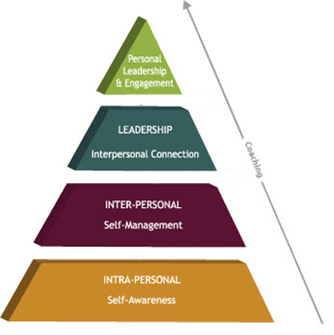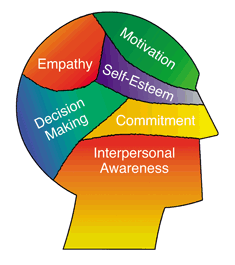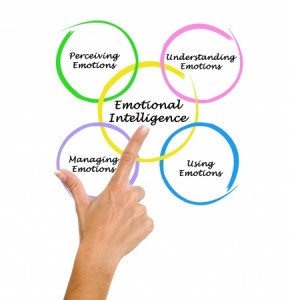Change Management
Emotional Quotient = Gratitude
Is there a direct correlation between being present to one’s emotions and gratitude? Recent survey findings created headlines about a shocking decline in the average decline in mid-level manager’s happiness over the last several decades. While many in the media rushed to conclusions about the impact of the research on technology and social media limitation of personal interaction today, Green Power Guy Anthony De Vito avoids easy judgments and examines the causes and the appropriate response to a contemporary crisis for this social media embedded corporate culture.
 Gratitude helps employees and staff feel appreciated and motivated. Dozens of studies over the last decade have shown that gratitude — for anything, not just work stuff — is a key component of happiness.
Gratitude helps employees and staff feel appreciated and motivated. Dozens of studies over the last decade have shown that gratitude — for anything, not just work stuff — is a key component of happiness.
Why is gratitude so important? To put it most simply: Developing a sense of gratitude allows you to see the good aspects of your life, which allows you to be more content. This, in turn, helps you to get along with people more easily.
Cultivating gratitude is important to emotional intelligence because it involves a) emotional awareness (“am I grateful or ungrateful”?) and emotional self-regulation (“how can I make myself more grateful, so that I’m happier and more effective in my daily life?”).
That’s good for your personal life, of course. But it’s also good for your business life. For instance, psychological research has shown that:
- GRATITUDE is statistically linked to happiness, pride, and hope;
- GRATITUDE is a key component of subjective well-being;
- PEOPLE who feel grateful statistically are 25% happier (and also tend to sleep better)
- GRATEFUL people are emotionally supportive of others, as well as kind and helpful.
How to Get from Where You are To Where You Want to Be
Anthony De Vito is uniquely qualified to coach you on success. He is an inspirational keynote speaker, internationally recognized transformational trainer, and highly acclaimed personal success coach. Knowing how to achieve success is like knowing the combination to a lock. If you are missing any of the numbers, or have them in the wrong order, the lock won’t open. In this fast-paced, entertaining and powerful seminar, based on his latest book, EQ=G: Gratitude Is Habit Forming, Anthony will teach you his proven breakthrough success system that guarantees you greater levels of peak performance and success in every area of your life—your career, your finances, and your personal life.
Here are a few of the things you’ll learn:
- How to double your results/income and double your free time in 3 years or less.
- A simple but powerful formula EQ=G, that will empower you to handle any experience more responsibly, effectively and successfully.
- How to clarify your purpose, vision and goals, including the latest research on goal setting and goal achievement and how to apply it to your life.
- How to change your self-talk and your limiting beliefs to better support your success.
- How to program your subconscious mind to unleash greater creative thinking and increased motivation to act on your ideas.
- How to more effectively use the Law of Attraction to accelerate your success.
- The three main ways people sabotage their success and how to overcome them.
- How to overcome your fear of failure and get into action.
- How to overcome your fear of rejection and ask for what you want and need.
- Why it’s important to surround yourself with positive, success-oriented people.
- And so much more
As a result of this presentation, you will be able to experience new confidence and commitment, on all levels—taking risks, making decisions, pushing through your fears and limiting beliefs, asking for what you want, creating the support teams you need, taking the necessary actions to achieve breakthrough success, and persevering in the face of obstacles and challenges.

Gratitude Practice Explained
The holiday season is a good time to think about gifts, and not just the paper-wrapped kind. The people in your life can themselves be gifts—and so can a thousand other things, big and little, many of which you probably overlook day to day. Taking time during the holidays to notice, contemplate, and express gratitude for these people and things can make your holidays far more meaningful. Gratitude is a healing and supportive emotion, too. If you’re struggling with family drama, stressful travel, or disappointments, the practice of gratitude can help you through.
 What are the benefits of gratitude?
What are the benefits of gratitude?
More than any other personality trait, gratitude is strongly linked to mental health and life satisfaction. Grateful people experience more joy, love, and enthusiasm, and they enjoy protection from destructive emotions like envy, greed, and bitterness. Gratitude also reduces lifetime risk for depression, anxiety, and substance abuse disorders, and it helps people entangled with those and other problems to heal and find closure. It can give you a deep and steadfast trust that goodness exists, even in the face of uncertainty or suffering.
(center)
 What is gratitude practice?
What is gratitude practice?
Gratitude isn’t just an emotion that happens along, but a virtue we can cultivate. Think of it as something you practice as you might meditation or yoga.
Gratitude practice begins by paying attention. Notice all the good things you normally take for granted. Did you sleep well last night? Did someone at work or on the street treat you with courtesy? Have you caught a glimpse of the sky, with its sun and clouds, and had a moment of peace? It also involves acknowledging that difficult and painful moments are instructive and you can be grateful for them as well.
Second, consider writing about it in a journal or in a letter. Writing helps you organize thoughts, accept experiences, and put them into context, and gratitude journaling may bring a new and redemptive frame of reference to difficult life situations. It also helps you create meaning when you place everyday experiences within a framework of gifts and gratefulness. By writing, you can magnify and expand on the sources of goodness in your life, and think about what resources you’ve gained from your experiences, even bad ones.
In one study, people randomly assigned to keep weekly gratitude journals exercised more regularly, reported fewer physical symptoms, felt better about their lives, and were more optimistic about the upcoming week compared to people assigned to record hassles or neutral events. In another, young adults who kept a daily gratitude journal reported higher alertness, enthusiasm, determination, attentiveness and energy compared to those who focused on hassles or compared themselves to others less fortunate.
Finally, expressing gratitude completes the feeling of connection. Many people in your life have helped you in one way or another. Have you thanked them? Consider sending a letter to someone telling them what their actions meant to you, even if—especially if—it happened long ago. As for a response to blessings that don’t come from people, the arts and many faith traditions offer countless ways to express our gratitude. It may be as simple as a moment of deliberate reflection. Either way, the practice of gratitude may be the best holiday gift of all.
A Cultivated Habit of Gratitude Leads to a Higher Emotional Quotient
To inquire about setting up customized training, contact us at: Training@GreenPowerGuy.com


